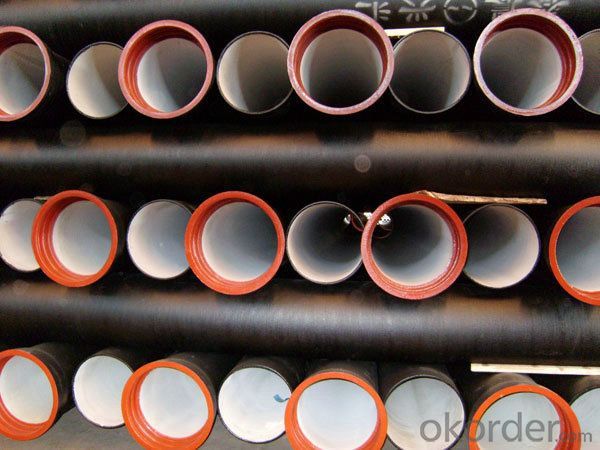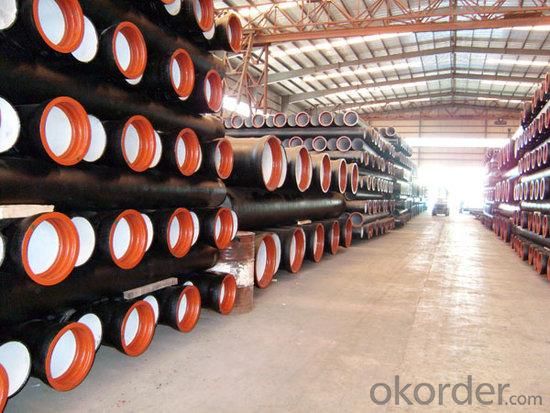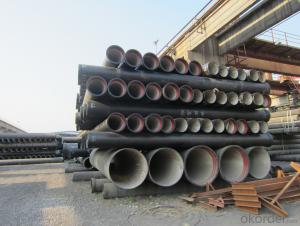Ductile Iron Pipe of China DN400 EN545/EN598/ISO2531 for Water Supply
- Loading Port:
- China main port
- Payment Terms:
- TT or LC
- Min Order Qty:
- 20 m.t.
- Supply Capability:
- 100000 m.t./month
OKorder Service Pledge
OKorder Financial Service
You Might Also Like
1,Ductile Iron Pipe Description :
1) Pipes confirm to ISO2531,K9 class,T type joint,6m long,with inside cements lining conform to ISO4179, outside Zinc spraying(130g/m2) and bitumen coating(70μm) conform to ISO8179.
2) Pipe ends: Spigot and socket ends, with 100% SBR rubber gaskets accoding to ISO4633
3) we can do third party inspection according to customer's request.
4) Our products have been sold to many international market, such as Middle East and South East Asia and Africa.
2,Main Features of the Ductile Iron Pipe:
•High yield strength
•High tensile Strength
•High corrosion resistance
•Pressure Resistence
•Anti-corrosion
•Installation is convenient
•Satisfy the highest hygienic standards
1. Material: Ductile iron grade 500-7/ 450-10 in accordance with ISO1083
2. Standard: ISO 2531, EN545, EN598, ANSI, AWWA
3. Certificate: ISO9001, ISO14001, SGS, NSF, WRAS
4. Test: In accordance with ISO 2531 / EN 545 / EN598 and 100% water pressure test
5. Length: 6m or cut into 5.6m, 5.7m, 5.8m
6. Internal Lining: Cement, conform to ISO4179
7. External coating: Zinc + Bitumen, conform to ISO8179
3,Ductile Iron Pipe Images:


4. Ductile Iron Pipe Specification
Place of Origin: China (Mainland)
Model Number: DN80-1600
Length: 6M/5.7M/NEGOTIATED
Standard: ISO2531 / EN545
Application: Potable/Sewage Water
Diameter: DN80-1600
Shape: Round
Hardness: 230
Pipe Wall Thickness: standerd
Pull Strength: 420
Yield (≥ MPa): 300
Material: Ductile Iron
water ductile iron pipe: SO2531 / EN545 DI pipe
5.FAQ:
We have organized several common questions for our clients,may help you sincerely:
1.Q: Why would you choose ductile iron pipe rather than other pipe materials?
A:The reasons are obvious for that not only ductile iron pipe possesses the inherent strength and flexibility of ductile iron, combined with proven corrosion protection systems, but also the cost savings can be achieved from design to installation and commissioning.
2.Q:Why can you guarantee the inner of pipes can’t be corroded?
A: High alumina cement mortar lining and sulphate-resistant cement mortar lining. These two special linings are applicable to inner anti-corrosion for sewage pipes, improving resistance to erosion of the sewage components.
- Q:What is the expected corrosion protection system for ductile iron pipes?
- Typically, the expected corrosion protection system for ductile iron pipes involves a combination of external coatings, internal linings, and cathodic protection. To protect against corrosion, external coatings are applied to the pipe's exterior surface. These coatings, usually fusion-bonded epoxy, polyethylene, or polyurethane, act as a barrier against corrosion from soil, water, and chemicals. Furthermore, they play a crucial role in prolonging the pipe's lifespan. In order to safeguard against corrosion caused by the transported fluid, internal linings are applied to the pipe's interior surface. These linings, which can be made of cement mortar, epoxy, or polyurethane, provide a smooth and protective layer that prevents the formation of rust and scale. Cathodic protection is an electrochemical technique employed to shield ductile iron pipes from corrosion. It involves the utilization of sacrificial anodes or impressed current systems to generate a protective electrical current that counteracts the corrosion process. By employing this method, the formation of rust is prevented, thereby extending the pipe's longevity. It is important to acknowledge that the specific corrosion protection system for ductile iron pipes may differ depending on the application and environmental factors. To determine the appropriate corrosion protection system for a specific ductile iron pipe installation, consulting with corrosion experts and adhering to industry standards and guidelines is of utmost importance.
- Q:Can ductile iron pipes be used for offshore oil and gas installations?
- Yes, ductile iron pipes can be used for offshore oil and gas installations. Ductile iron is a type of cast iron that offers excellent strength and durability, making it suitable for various applications including offshore environments. These pipes have high tensile strength and are resistant to corrosion, making them ideal for transporting oil and gas in harsh offshore conditions. Ductile iron pipes are often used for subsea pipelines, risers, and flowlines due to their ability to withstand high pressures and resist external forces such as waves, currents, and impacts. They are also capable of handling the high temperatures and pressures associated with offshore oil and gas production. Furthermore, ductile iron pipes have a long service life and require minimal maintenance, reducing the overall operating costs for offshore installations. They are also readily available and cost-effective compared to other materials such as steel. However, it is important to consider factors such as the specific requirements of the project, environmental conditions, and the compatibility of ductile iron with other materials used in the offshore installation. Proper engineering analysis and design considerations should be undertaken to ensure the suitability and safety of ductile iron pipes for offshore oil and gas installations.
- Q:Are ductile iron pipes suitable for wastewater systems?
- Yes, ductile iron pipes are suitable for wastewater systems. They have high strength, durability, and corrosion resistance, making them ideal for handling the demanding conditions and harsh environment typically found in wastewater systems. Additionally, ductile iron pipes have good joint integrity, which ensures leak-free connections and minimizes maintenance requirements in wastewater applications.
- Q:Can ductile iron pipe be used for water treatment plants?
- Yes, ductile iron pipe can be used for water treatment plants. Ductile iron pipes are known for their strength, durability, and corrosion resistance, making them suitable for transporting water and other fluids in various industrial applications, including water treatment plants.
- Q:What are the specifications for the installation of water ball iron pipes?
- Ductile cast iron pipe is characterized by mild, high, thin wall, pressure resistance, impact resistance, corrosion resistance, seismic resistance and other properties. The flexible interface is used for the pipeline interface, and there is a certain elongation and deflection angle. The utility model has the advantages of the raw iron pipe and the steel pipe material, and avoids the defects of iron and steel.
- Q:How are ductile iron pipes protected against freeze-thaw cycles?
- Ductile iron pipes are protected against freeze-thaw cycles through several measures. Firstly, the material used in ductile iron pipes is inherently resistant to low temperatures and can withstand freezing conditions without becoming brittle or prone to cracking. Additionally, the pipes are often coated with a protective layer, such as cement mortar lining or polyethylene encasement, to provide an extra barrier against freeze-thaw damage. These coatings serve to insulate the pipe and prevent direct contact between the iron and the surrounding environment. Furthermore, ductile iron pipes are commonly designed with joints that allow for movement and flexibility, which helps to accommodate any expansion or contraction that may occur during freeze-thaw cycles. This flexibility reduces the risk of pipe breakage or damage due to the pressure exerted by freezing water inside the pipe. Moreover, proper installation practices, including adequate bedding and backfilling, are crucial in protecting ductile iron pipes against freeze-thaw cycles. Ensuring that the pipes are properly supported and surrounded by suitable materials helps to minimize the impact of freezing temperatures on the structural integrity of the pipes. Regular inspection and maintenance of ductile iron pipes are also essential in identifying any potential issues caused by freeze-thaw cycles. Periodic assessments can help detect any signs of damage or deterioration, enabling timely repairs or replacement to prevent further damage. In summary, ductile iron pipes are protected against freeze-thaw cycles through the inherent resistance of the material, protective coatings, flexible joints, proper installation practices, and regular maintenance. These measures collectively contribute to the durability and longevity of ductile iron pipes, even in cold weather conditions.
- Q:What are the different types of linings available for ductile iron pipe?
- There are several types of linings available for ductile iron pipe, including cement mortar lining, polyethylene lining, and polyurethane lining.
- Q:Are ductile iron pipes suitable for airport runway drainage?
- Ductile iron pipes are indeed a suitable choice for airport runway drainage. Their exceptional strength and durability enable them to endure heavy loads and extreme conditions commonly encountered in airport operations. Moreover, these pipes possess corrosion resistance, a vital characteristic for drainage systems exposed to diverse chemicals and environmental factors. Additionally, their smooth inner surfaces facilitate efficient water flow and prevent blockages that could disrupt the drainage system. Furthermore, ductile iron pipes are effortless to install and maintain, thus establishing themselves as a dependable option for airport runway drainage systems.
- Q:What is the typical wall thickness of ductile iron pipes?
- The typical wall thickness of ductile iron pipes varies depending on the size and the intended use of the pipe. Generally, ductile iron pipes have a wall thickness ranging from 0.25 inches (6.35 mm) to 0.5 inches (12.7 mm). However, for larger diameter pipes or those used in high-pressure applications, the wall thickness can be even greater. It is important to consult industry standards and specific project requirements to determine the appropriate wall thickness for a ductile iron pipe.
- Q:How are ductile iron pipes connected?
- Ductile iron pipes are typically connected using several methods, including flanged joints, mechanical joints, and push-on joints. Flanged joints involve connecting two pipe sections with a flanged coupling. The pipe ends have flanges that are bolted together, creating a secure and leak-proof connection. This method is commonly used for larger diameter pipes or in applications that require a rigid joint. Mechanical joints utilize a mechanical joint gland and rubber gasket to create a watertight seal. The pipe ends are inserted into the gland, and the bolts are tightened to compress the gasket, ensuring a reliable connection. This method is often used in water distribution systems due to its flexibility and ease of installation. Push-on joints involve using a rubber gasket to create a tight seal between pipe sections. The gasket is placed in a groove on one pipe end, and the other pipe is pushed onto it, creating a compression seal. This method is quick and simple, making it suitable for various applications, including sewer systems and underground piping. Overall, the choice of connection method for ductile iron pipes depends on factors such as pipe diameter, application requirements, and installation conditions. It is crucial to follow the manufacturer's recommendations and industry standards to ensure proper installation and reliable performance.
1. Manufacturer Overview |
|
|---|---|
| Location | |
| Year Established | |
| Annual Output Value | |
| Main Markets | |
| Company Certifications | |
2. Manufacturer Certificates |
|
|---|---|
| a) Certification Name | |
| Range | |
| Reference | |
| Validity Period | |
3. Manufacturer Capability |
|
|---|---|
| a)Trade Capacity | |
| Nearest Port | |
| Export Percentage | |
| No.of Employees in Trade Department | |
| Language Spoken: | |
| b)Factory Information | |
| Factory Size: | |
| No. of Production Lines | |
| Contract Manufacturing | |
| Product Price Range | |
Send your message to us
Ductile Iron Pipe of China DN400 EN545/EN598/ISO2531 for Water Supply
- Loading Port:
- China main port
- Payment Terms:
- TT or LC
- Min Order Qty:
- 20 m.t.
- Supply Capability:
- 100000 m.t./month
OKorder Service Pledge
OKorder Financial Service
Similar products
New products
Hot products
Hot Searches
Related keywords

























